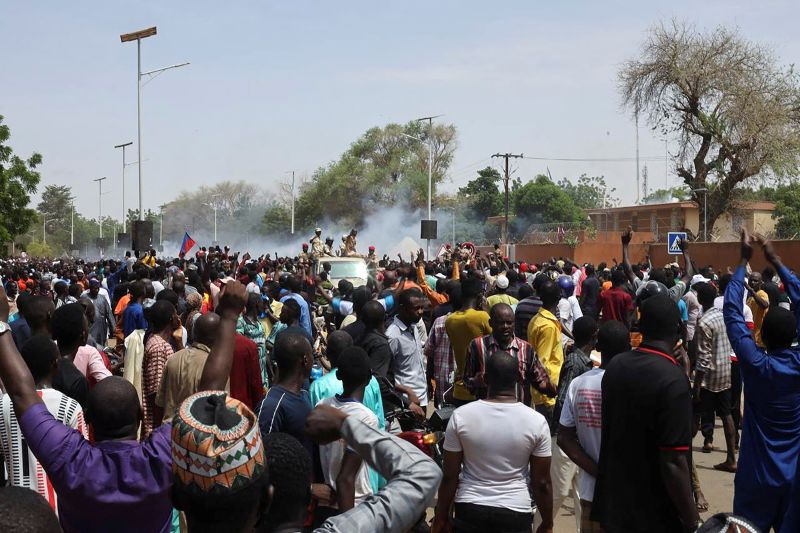
Pro-coup protesters in Niger shout ‘long live Putin’ as new leaders face calls to cede power
Tense and sometimes violent scenes played out in front of the French Embassy in Niger Sunday as thousands of people who support a military coup voiced anger over France’s influence in its former colony.
Demonstrators shouted shouted support for Russian leader Vladimir Putin despite calls from the Kremlin to release the country’s democratically elected president, Mohamed Bazoum.
Some protesters tore down a plaque identifying the Embassy, stomped on it and then replaced it with Russian and Nigerien flags. Shouts of “long live Putin,” “long live Russia” and “down with France” could be heard among the crowds.
Nigerien security forces were seen deploying tear gas in an attempt to disperse the protesters. One photograph from the scene showed people trying to start a fire outside the compound.
President Emmanuel Macron’s office said France would immediately retaliate against anyone who attacks French nationals or facilities in Niger.
Much of the international community has condemned the coup, which saw members of the Niger presidential guard overthrow Bazoum and install a military junta called the National Council for the Safeguard of the Homeland.
Niger has a long history of military coups since its independence from France in 1960, though in recent years it had been less politically unstable. When Bazoum came to office in 2021, it was the country’s first democratic transfer of power.
The Economic Community of West African States (ECOWAS) on Sunday demanded that Bazoum be released and reinstated within a week. Should the junta remain in charge, the group said it would “take all measures necessary to restore constitutional order in the Republic of Niger,” including the use of force.
ECOWAS also announced a bevy of punitive measures, including closing land and air borders with Niger.
The group said it would reject any form of resignation that may purportedly come Bazoum, who they consider a hostage.
France and the European Union said earlier that they would support ECOWAS organizations if they decide to sanction the junta. The two had already cut off financial support for Niger.
Niger’s military leaders may have found one potential ally: the country’s eastern neighbor, Chad. Chadian President Mahamat Idriss Deby Itno was in Niamey, Niger’s capital, on Sunday, according to a source close to the Nigerien military, and photographed alongside a key figure in the putsch. Chad is not a member of the ECOWAS.
‘We’re going to get France out of Africa’
Niger was a French colony for more than 50 years before its independence in 1960. Diplomatic ties between the two countries were strong before Thursday’s putsch, but many Nigeriens believe France has continued to act as imperial power when dealing with Niger, robbing it of natural resources and dictating how its leaders steer the economy. Niger is one of the world’s poorest countries and receives hundreds of millions of dollars each year in assistance.
“Niger has suffered too much under French orders. I’ve been unemployed for 10 years because of their system,” said Karimou Sidi, one of the demonstrators. “We want freedom.”
Hadiza Kanto, a university student who had come to protest, said he supported the leaders of the coup because “they are against France who robbed us all.”
“We’re going to get France out of Africa,” Kanto said.
Russia has, in recent years, attempted to capitalize on that anti-colonial sentiment to bolster its influence across the continent.
Seventeen African heads of state traveled to St. Petersburg on Thursday for an Africa-Russia summit, though turnout was far lower this year than in previous years, likely due to the war in Ukraine.
The anti-France and pro-Russia movement isn’t new in the region. It has been observed in various countries in the Sahel in the past years, most recently in Burkina Faso where the military government demanded the departure of French troops from the country earlier this year.
Correction: This story has been updated to correct that Niger became independent in 1960.
